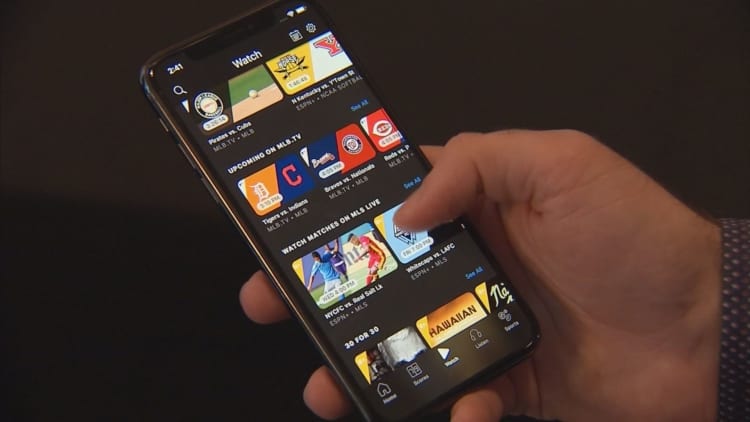ESPN+ surprised analysts by surpassing 1 million paid subscribers in just five months.
But with the goal of streaming 10,000 live events in its first year, it could be a costly proposition for Disney.
Disney launched the streaming ESPN+ service in April. The package, which does not require a cable or satellite subscription to watch sports, costs $4.99 a month or $49.99 for the year. Programming includes sporting events that may not appear on the traditional ESPN channels, including college sports, National Hockey League games, Major League Soccer games and Ultimate Fighting Championship bouts. It has also featured new "30 for 30" documentaries and original nightly programming.
Plausible estimates suggest that the service will cost $200 million to $500 million in its first year. Here's a breakdown:
Technology
ESPN+ is powered by BAMTech, a streaming video technology platform. Disney purchased majority ownership of the company from MLBAM, the digital media arm of Major League Baseball. It initially invested $1 billion in 2016, and it paid an additional $1.58 billion in August 2017 to increase its ownership stake to 75 percent.
BAMTech will have an "adverse impact" of $180 million this fiscal year, Disney Chief Financial Officer Christine McCarthy said during the company's second-quarter earnings call with analysts. Some analysts think the damage will be worse: BTIG managing director Rich Greenfield estimates BAMTech as a whole could lose $250 million to $300 million by the end of this year.
But it doesn't make sense to count the entire costs of BAMTech toward ESPN+. While it is the most prominent Disney service on the platform, BAMTech also powers the digital services for the National Hockey League, World Wrestling Entertainment, Time-Warner's HBO Now and others.
Macquarie analysts combined BAMTech and marketing costs, ignoring content costs, and estimated that the ESPN+ service would cost Disney $100 million over the next three years.
Wedbush's Michael Pachter said the technology costs for ESPN+ alone in its first year will be $50 million to $75 million.
"The table stakes to get in are pretty steep," Pachter said. "The first year Netflix got into the streaming business (2007), its technology spending grew by $23 million," Pachter said.
Content
While ESPN had to pay for rights to the content at some point, many of the ESPN+ streaming sports rights were transferred from existing deals, according to analysts and one person who has knowledge of the negotiations.
Other streaming events were bundled with TV rights deals, making it hard to delineate how much everything costs.
ESPN is using the promise that sporting events could air on its TV channels to get additional digital rights for little to no cost, according to the person with knowledge of the negotiations. Outside the marquee events like college basketball and football and professional leagues like MLS, streaming rights to many of the smaller games and niche matches cost very little — no more than $1,000 per sports event, game or match.
But ESPN+ is acquiring streaming rights to more mainstream sports, which can be costly.
For instance, ESPN signed a five-year deal with the UFC in May to air 10 events on TV and stream 20 more a year. The total value of that deal was $150 million, according to USA Today.
Another league switched pay per view rights to ESPN+ in a deal worth $1.5 million, a source with knowledge of negotiations said.
ESPN+ also got multiyear nonexclusive streaming rights for Riot Games' popular video game "League of Legends," which were previously held by BAMTech. Terms of the new agreement were not discussed, but the original seven-year exclusive deal with BAMTech was worth $300 million.
Wedbush puts the committed content costs figure for the first year at $100 million to $200 million.
"The content deals are also likely very expensive, as the content providers don't want to risk failure of the service, and typically seek large guarantees," Pachter said. "The rest of their feed is primarily ESPN content already produced for broadcast, so the incremental cost is very low or zero."
BTIG's Greenfield estimates this year's committed content costs are around $150 million due to the UFC deal, with additional "incremental" costs. But he said it will need to add another $300 million to $400 million in sports rights over the next 12 months to continue to supplement the service.
"Because they've added on so many sports rights, those losses are going to balloon if they don't add more subscribers," Greenfield said.
Why profit may not matter
Overall, ESPN+ has probably had expenses of a little over $200 million this year, according to Pachter. Greenfield puts it at around $500 million. Revenue estimates are all over the map, but almost certainly $100 million this year.
ESPN declined to comment.
That's a notable but affordable cost for Disney. Last quarter, the cable networks segment, which includes the entire ESPN business, BAMTech and A&E, earned $1.4 billion on revenue of $4.2 billion. Overall, Disney earned $2.9 billion on revenue of $15.2 billion.
In addition, making money might not be the major concern for Disney right now. A tech executive who has seen ESPN+'s pitch deck said the service is meant to reach viewers who will eventually be cutting their cable subscription — even if it means losing money for now.
Macquarie senior media analyst Tim Nollen said profitability isn't the main goal for ESPN+. Disney is using the service to work out issues for future over-the-top services, including Disney's upcoming direct-to-consumer streaming service and a full ESPN streaming service that contains more of the content shown on TV, he said.
"In a world where consumers are increasingly watching content over-the-top and dropping the basic cord because they can buy smaller packages, Disney is trying to assess how it can ultimately run an over-the-top sports service, and ESPN+ is a test case for that," Nollen said.
Tag Garson, a senior VP at Wasserman, which negotiates broadcast and streaming league rights with media companies, agrees that profit is secondary at this point.
"The company continues to invest in technologies in order to deliver content to consumers in ways in which they will want to view it, and where they are consuming it today, and down the road," Garson said.
"[Disney CEO] Bob Iger and his senior leadership team always have been proactive and smart in their approach to changing consumer habits across all facets of the company, and this is no different. The decisions being made aren't for the short term, rather looking out to the future," Garson said.







